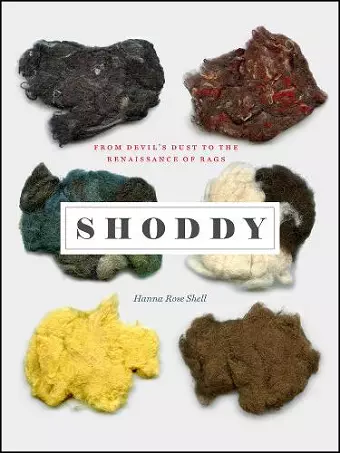Shoddy
From Devil's Dust to the Renaissance of Rags
Format:Hardback
Publisher:The University of Chicago Press
Published:3rd Apr '20
Should be back in stock very soon

You know shoddy: an adjective meaning cheap and likely poorly made. But did you know that before it became a popular descriptor, shoddy was first coined as a noun? In the early nineteenth century, shoddy was the name given to a new textile material made from reclaimed wool. Shoddy was, in fact, one of the earliest forms of industrial recycling as old rags and fabric clippings were ground into "devil's dust" and respun to be used in the making of suits, army uniforms, carpet lining, mattress stuffing, and more. In Shoddy, Hanna Rose Shell takes readers on a vivid ride beginning in West Yorkshire's Heavy Woollen District and its "shoddy towns," and traveling to the United States, the third world, and waste dumps, textile labs, and rag shredding factories, in order to unravel the threads of this story and its long history. Since the time of its first appearance, shoddy had become both pervasive and politically and culturally controversial on multiple levels. The use of the term "virgin" wool--still noticeable today in the labels on our sweaters--thus emerged as an effort by the wool industry to counter shoddy's appeal: to make shoddy seem shoddy. Public health experts, with encouragement from the wool industry, worried about sanitation and disease--how could old clothes be disinfected? As well, the idea of wearing someone else's old clothes so close to your own skin was discomforting in and of itself. Could you sleep peacefully knowing that your mattress was stuffed with dead soldiers' overcoats? Over time, shoddy the noun was increasingly used as an adjective that, according to Shell, captured a host of personal, ethical, commercial, and societal failings. Introducing us to many richly drawn characters along the way, Shell reveals an interwoven tale of industrial espionage, political infighting, scientific inquiry, ethnic prejudices, and war profiteering. By exploring a variety of sources from political and literary texts to fabric samples and old military uniforms, antique and art photographs and political cartoons, medical textbooks, and legal cases, Shell unspools the history of shoddy to uncover the surprising journey that individual strands of recycled wool - and more recently a whole range of synthetic fibers from nylon to Kevlar - may take over the course of several lifetimes. Not only in your...
"Shoddy is that rare book that takes you from the direct experiences you share with the author (what to do with your used clothes? the feeling of 'doing good' when you donate them to clothe someone 'less fortunate') to the larger social, economic, historical, and yes, moral universe in which those experiences live. Shell brings gives us this kind of journey by searching for shoddy. Through her we learn about the human costs of the industrial revolution, learn about British Chartism, the economic realities of the American Civil War, learn about the ideas that animated dissent--Carlyle, Disraeli, and Marx, just for a start, and so much more, all through the eyes of shoddy. It is an exemplary book in its use of the visual record to weave a narrative that implicates current practice, not just in how we do scholarship across a range of fields in media and science and technology studies, but how we think about ourselves. Shoddy is a book that will change your mind." --Sherry Turkle, author of Reclaiming Conversation: The Power of Talk in a Digital Age
ISBN: 9780226377759
Dimensions: unknown
Weight: unknown
272 pages